MPs are best known for their role in the debating chamber but are only required in the House for a certain number of days a year - 96 last year. Phil Smith caught up with National's list MP for Wellington Central, Paul Foster-Bell, to find out what he does in his week off.
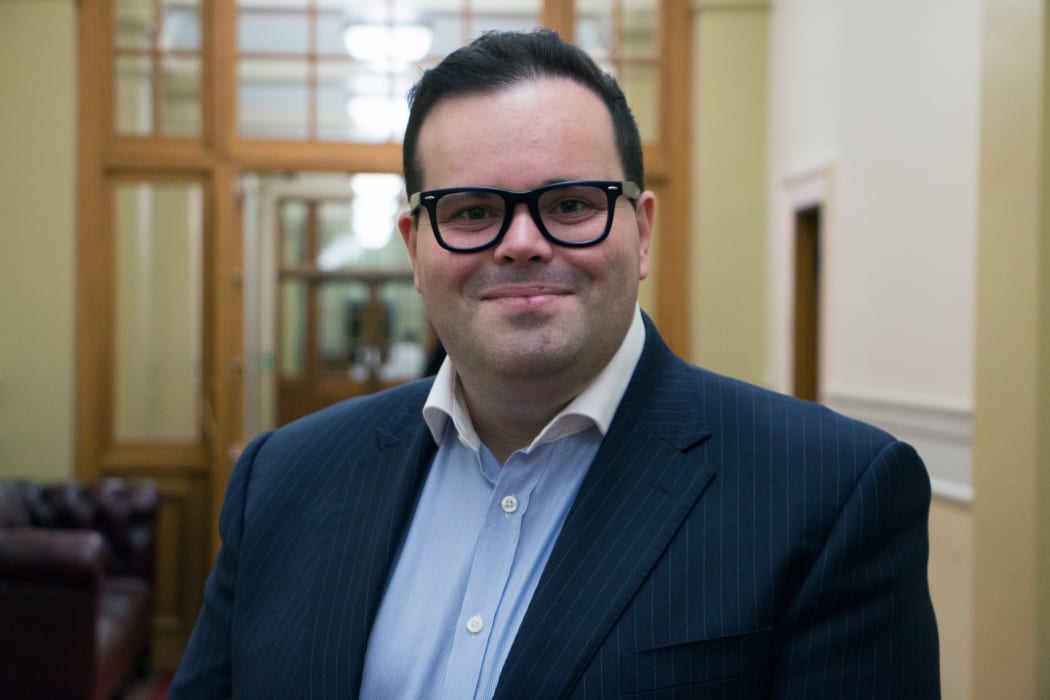
Photo: RNZ / Daniela Maoate - Cox
I’m sitting on a well stuffed couch in Paul Foster-Bell’s office chatting over the opening items in the TV news. Foster-Bell sits with the remote in hand observing the news with a political eye. He might prefer to follow the news more closely but he politely allows my comments to draw us off into the side-lines; Trump, journalism, the stories of the day.
It’s a nice office in Parliament House, one of a long corridor of similar suites, with a settee and a drinks cabinet; a home-away-from-home of the kind necessary when you’re often required to be ‘at the office’ for thirteen hours a day.
But not today. It’s not a sitting week so the House isn’t meeting and MPs are freed from the demands of standing orders or the party whips. Today an MP might be relaxing at home, or in a café or even at the beach. After all it’s a stunning day outside, one of the few hot days left in Wellington’s paltry summer, and he’s still at the office in the evening.
It’s coming to the end of Foster-Bell’s first term in Parliament and two days before we meet he announced that he won’t seek re-election. I ask whether being an MP has been like he expected.
“You get opportunities that you never imagine, and actually learn about areas of our society, that as someone who grew up in a loving middle New Zealand household we don't experience necessarily. A lot of us don’t experience. You see the other side of life and sometimes that’s pretty dark actually.”
We agree that the reality of most jobs are unlike their external perceptions; Foster-Bell knows from experience that diplomats do not spend all their days at cocktail parties.
However he says government may be the exception.
“[The TV show] Yes Minister is absolutely factual and true, and should be followed as an instruction manual. But other than that, most of the depictions of any career are somewhat romanticised.”
Which of the Yes Minister characters is he?
“I like Bernard the best, he’s by far the funniest, but I probably get accused of being more like Sir Humphrey.”
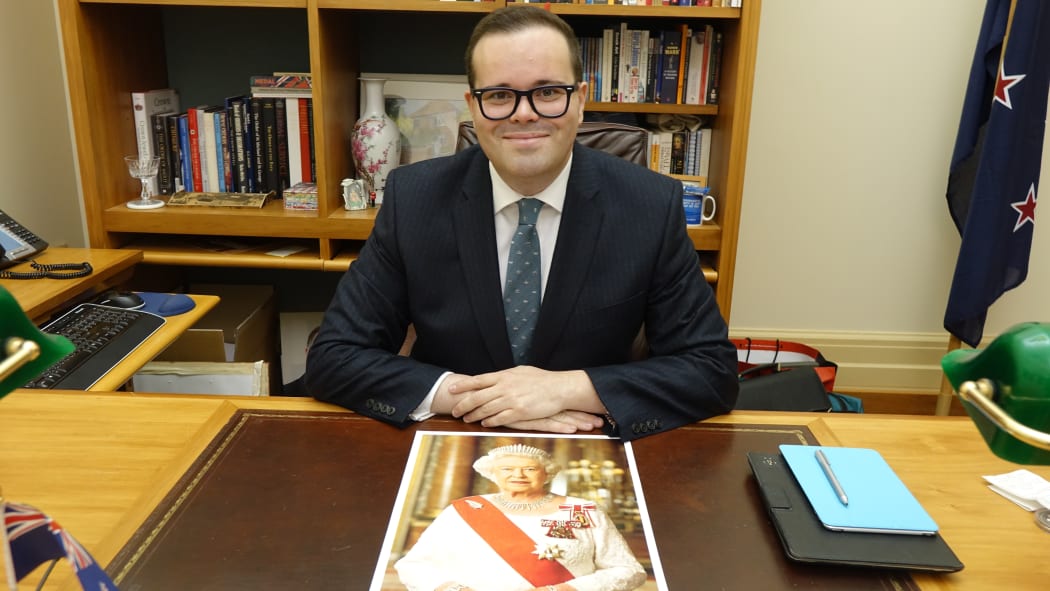
Photo: RNZ/Amelia Langford
In non-sitting weeks, when most MPs head home to their own districts, the parliamentary precinct is a quieter place.
The staff that turn the wheels of state busily prepare for the next onslaught of bills and debates, committees and questions that are its beat. They bustle around with a slightly loosened dress code but with similar intensity. Groups of tourists pulse from the Beehive through the chambers of Parliament House like blood pumping around a body.
So what are the MPs doing?
“Our time on both the recess weeks, but also Mondays and Fridays when the House doesn’t usually sit, and actually weekends, is time we devote to constituency work; which is a pretty important part of the job. Legislating is important, but so is servicing the needs of our constituents.“
People recognise that electorate MPs have two jobs (in Wellington and in their local seat), but many List MPs, despite not winning an electorate, still act as ersatz electorate MPs, flying the local flag for their party and offering similar services. Foster-Bell is one of them. While Grant Robertson is Wellington Central’s electorate MP, Foster-Bell is his National Party shadow.
“I don’t get the same staffing quota that a constituency MP would get, but none-the-less I’ve got a couple of really good people who have become quite expert at negotiating the minefield that is government departments, and sometimes people fall through the cracks in those departments. We’ve actually got some really good results.”
I had a rapid HIV test today at Out in the Park. Thanks to the AIDS Foundation for their great work. pic.twitter.com/wzlfAZLN6L
— Paul Foster-Bell MP (@PARFosterBell) March 18, 2017
Electorate offices act as all-comers fix-it centres, offering advice and potentially help to a wide gamut of people and issues. Some people walk in off the street but that’s not the norm.
“…we also have these days a lot more phone messages and emails and tweets and Facebook messages, with everything from people having a difficulty getting a worker in for their business, because they’re having visa problems, through to someone who has an issue with a government agency; ACC, housing, perhaps Social Development.
“I think we’ve got a pretty good track record at providing quality help to those people. Often, when people come to a member of Parliament it’s their last resort. They’ve perhaps tried the help desk at the government agency, and they’ve perhaps even taken some legal advice. The services we provide are free - they may not want to spend a fortune on a legal process. Often people are very frustrated when they come to speak to us.”
Foster-Bell says he tries to reach beyond his geographical responsibilities.
“I also have communities of interest I work with. Being the only openly gay MP within the government side I try and work with the LGBT community. But also one brings one’s own interests to the role and I try to help exporters because that’s something I’ve got a little bit of experience in.”
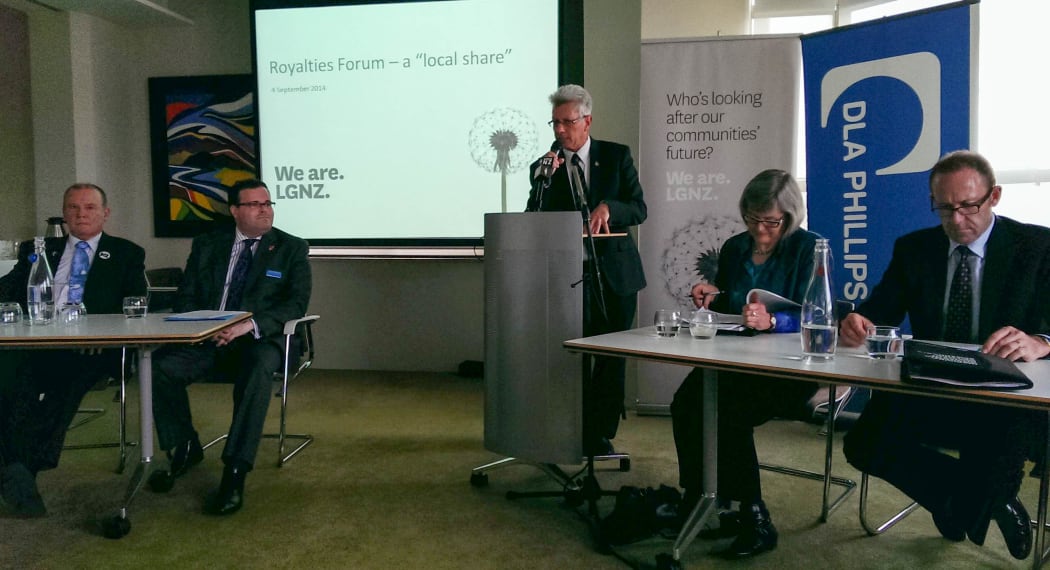
The local government New Zealand forum on oil royalties in 2014. From left to right: NZ First MP, Denis O'Rourke, National MP Paul Foster-Bell, Hauraki District Mayor, John Tregidga, Green MP Eugiene Sage and Labour MP, Andrew Little. Photo: RNZ / Michael Allan
Before the TV news has got too far beyond the main headlines Foster-Bell flicks off the remote and rises to leave for his evening function, the annual cocktail party and auction for The Organisation for Rare Disorders; a money raising event at the Wellington Club.
“Last year I ended up bidding on a piece of art, and that now graces my apartment wall. And I also donate a prize usually. It’s an auction, so I find lunch at Bellamy’s is something that people are prepared to pay more than its worth in dollar terms; and as I say it’s a really good cause so that’s something that seems worthwhile to do.”
Between local community, communities of interest, and good causes, there’s plenty to be going on with.
“You also kind of have to make your face shown in the area. And you pick out functions where there might be people who it’s just useful to network with.”
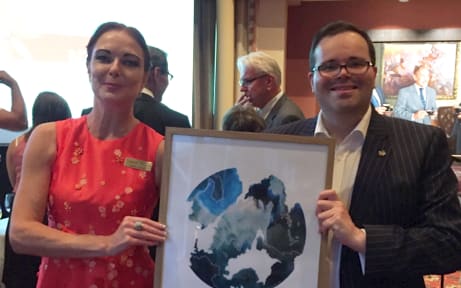
National List MP for Wellington Central Paul Foster-bell shows off a piece of artwork he won in the auction with the Chief Executive of NORD Letitia O'Dwyer (left). Photo: Supplied / Paul Foster-Bell
We trundle along the hazards of Wellington’s Terrace, strewn with road works, briefly stopping for a businessman to express how sorry he was to hear Foster-Bell is departing parliament. They agree to catch up soon and we move on.
“I’ve had quite a bit of work from the earthquake in terms of supporting particularly businesses. Initially Wellington didn’t get the package of support that the Marlborough region got, so we lobbied pretty hard, so that some of our local bars and restaurants, who are behind cordons would get the $500 a week for staff that just keeps them afloat, so that when the cordons come down they still exist and we have jobs for people to go back to.”
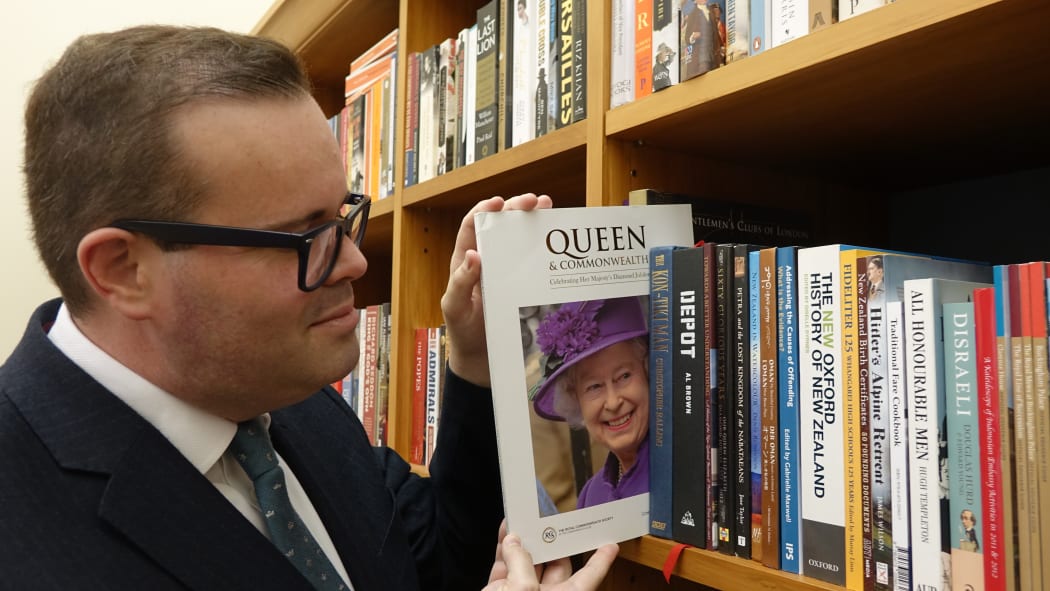
National MP and royalist Paul Foster-Bell poses with the Queen. Photo: RNZ/Amelia Langford
“There’s a limited amount of money in the kitty and everyone else wants their slice as well so you’re in competition with every other part of New Zealand to get I suppose, extra services, above the basic.”
I suggest that lobbying and getting what you want from Ministers must be a particular skill with some MPs better than others.
“Some people have the knack, but it is an important aspect of the role, because to a degree your success is judged on what you manage to win for your local area.”
I leave Foster-Bell and his assistant Luc Powell in the elegant rooms of The Wellington Club, in an interior thick with antique details, nestled inside a façade of giant children’s blocks. And tonight the clink of glasses, the meeting, the greeting, hearing complaints, explaining policy, raising toasts and raising money for a community cause.
Another day for a local MP, when the House is empty.


